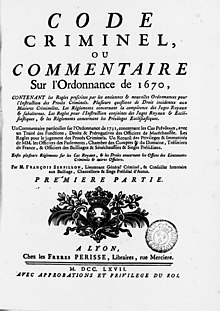The Criminal Ordinance of 1670 (French: Ordonnance criminelle de 1670, or Ordonnance criminelle de Colbert) was a Great Ordinance dealing with criminal procedure which was enacted in France under the reign of King Louis XIV. Made in Saint-Germain-en-Laye, the Ordinance was registered by the Parlement of Paris on 26 August 1670 and came into effect on 1 January 1671. It was one of the first legal texts attempting to codify criminal law in France. It remained in force until the French Revolution, when it was abrogated by a decree adopted by the National Constituent Assembly on 9 October 1789.[1]

The act broadened the jurisdiction of the nationwide policing force Maréchaussée to include burglary and popular disorder and confirmed its power to arrest any offender.[2] It also sought to combat abuse of their authority by putting enforcement under the supervision of local royal courts.[2]
History
editThe Ancien regime ruled without a penal code. On the other hand, they had a code of criminal procedure in the form of the ordonnance criminelle de 1670.[3]
Objectives
editMajor goals of the ordinance, were: to let no crime go unpunished; to prevent an innocent person for being convicted of a crime he did not commit; and to enable the judge to apply the criminal law with exactitude, which is to say, to establish a precise proportionality between the offense and the punishment for the offense.[4]
See also
editReferences
edit- ^ "La Naissance du droit de la défense en 1789" (in French). Le Cercle du Barreau. 2008-03-13. Archived from the original on 2009-05-14. Retrieved 2008-05-07.
- ^ a b Emsley, Clive (October 1999). "2 'The Most Useful Corps for the Nation…': The Maréchaussée". Gendarmes and the State in Nineteenth-Century Europe. Oxford, England UK: Oxford University Press. p. 14. doi:10.1093/acprof:oso/9780198207986.003.0002. ISBN 9780191677878.
- ^ Roux 1925, p. 177.
- ^ Roux 1925, p. 177–178.
Works cited
edit- Roux, Jean-André (1925). "Procédure pénale". Précis élémentaire de droit pénal et de procédure pénale [A primer on criminal law and procedure] (in French). Paris: Recueil Sirey. p. 177. OCLC 18140063.
Further reading
edit- Serpillon, François (1767). Code criminel, ou commentaire sur l'ordonnace de 1670 (in French). Vol. 1. Lyon: Perisse, frères.
- Serpillon, François (1767). Code criminel (in French). Vol. 2. Lyon: Perisse, frères.
- Serpillon, François (1767). Code criminel (in French). Vol. 3. Lyon: Perisse, frères.
- Serpillon, François (1767). Code criminel (in French). Vol. 4. Lyon: Perisse, frères.
External links
edit- "Full text of the Criminal Ordinance of 1670" (in French). Archived from the original on 2008-03-30. Retrieved 2008-04-15.